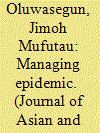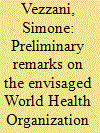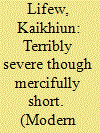|
|
|
Sort Order |
|
|
|
Items / Page
|
|
|
|
|
|
|
| Srl | Item |
| 1 |
ID:
105414


|
|
|
| 2 |
ID:
153099


|
|
|
|
|
| Summary/Abstract |
This paper examines how the British managed the 1918–1919 influenza epidemic in Lagos, the reactions of the local population to new sanitary and medical policies enforced during the period, and its social and political implications for future epidemic management in the colony. Unlike several studies which approach the history of the pandemic from global and national perspectives, a focus on Lagos, the colonial capital of Nigeria, one of Britain’s most important colonies provides this paper with a rare opportunity to engage with how local peculiarities informed decisions about the resolution of a global problem. Lagos is chosen as the terrain for discussion because of the ample data generated about it in the course of the 19th and 20th centuries (not just between European missionaries and the indigenous Lagosians, but also for other influential cultural and ethnic groups such as the Saro and Amaro (migrants from Brazil), and the Indian influence on medical policies in Lagos).
|
|
|
|
|
|
|
|
|
|
|
|
|
|
|
|
| 3 |
ID:
100068


|
|
|
|
|
| Publication |
2010.
|
| Summary/Abstract |
Over the last few decades, the World Health Organization (WHO) has played a significant role in the prevention and control of new strains of influenza virus in the human population. Beginning in the 1950s, it has coordinated a network of WHO-linked laboratories, charged with monitoring the changes in influenza viruses and favouring the timely sharing of virus samples, which is necessary for the development and production of vaccines. In December 2006, the said system was brought into question by Indonesia, according to which it was unfair and in conflict with the principle of state sovereignty over biological and genetic resources. Although very controversial, the Indonesian decision to interrupt the supply of candidate influenza vaccine strains boosted intergovernmental negotiation, until then not achieved, aimed at establishing a new WHO framework. This article examines the outcome of such a negotiation, as well as the aspects of the framework still under discussion. It emphasizes the innovative nature of the proposed benefit-sharing mechanism, which would promote access to vaccines mainly through the multilateralization of intellectual property rights governance. Similarities and differences between the envisaged framework and the benefit-sharing mechanism established by the Food and Agricultural Organization International Treaty on Plant Genetic Resources for Food and Agriculture in the field of access to plant genetic resources are analysed.
|
|
|
|
|
|
|
|
|
|
|
|
|
|
|
|
| 4 |
ID:
101739


|
|
|
|
|
| Publication |
2011.
|
| Summary/Abstract |
Infectious disease outbreaks primarily affect communities of individuals with little reference to the political borders which contain them; yet, the state is still the primary provider of public health capacity. This duality has profound effects for the way disease is framed as a security issue, and how international organisations, such as the World Health Organization, assist affected countries. The article seeks to explore the role that domestic political relationships play in mediating the treatment of diseases as security issues. Drawing upon an analysis of the securitisation of avian influenza in Vietnam and Indonesia, the article discusses the effect that legitimacy, competing referents and audiences have on the external and internal policy reactions of states to infectious diseases, specifically in their interpretation of disease as a security threat. In doing so, we extend upon existing debates on the Copenhagen School's securitisation framework, particularly on the impact of domestic political structures on securitisation processes in non-Western, non-democratic and transitional states.
|
|
|
|
|
|
|
|
|
|
|
|
|
|
|
|
| 5 |
ID:
175106


|
|
|
|
|
| Summary/Abstract |
The 1918–19 influenza epidemic arguably remains the worst natural disaster in the annals of colonial India. The scourge of the 1918–19 influenza in Punjab eclipsed the significant malaria epidemics of 1908 and the Bubonic plague catastrophe of the first decade of the 20th century. Over 800,000 people died from the outbreak between October and November 1918. This article examines the social and economic impacts of the 1918–19 influenza outbreak in Punjab. It argues that the scarcity of everyday food items as well as an escalation in the prices of staple foodstuffs were direct consequences of the epidemic. This study discovered that massive influenza mortalities triggered severe disruptions in the agricultural activities and public services in Punjab. Other studies had focused mainly on the spread and mortality of the epidemic in the public domains of colonial India. However, this study illuminates the socio-economic effects of an outbreak from a regional perspective. A focus on Punjab, the colonial capital of Northern India, affords us a rare privilege to gauge how epidemics influence the socio-economic spaces on a provincial basis.
|
|
|
|
|
|
|
|
|
|
|
|
|
|
|
|
| 6 |
ID:
077309


|
|
|
|
|
| Publication |
2007.
|
| Summary/Abstract |
The influenza epidemic swept through our midst in September and October, unhappily with fatal consequences to a number of friends in the Tamil community. We are glad to say that though terribly severe while it lasted, its duration was mercifully short. On the other hand, the great news that the armistice has been signed filled us with unaccustomed joy
|
|
|
|
|
|
|
|
|
|
|
|
|
|
|
|
|
|
|
|
|